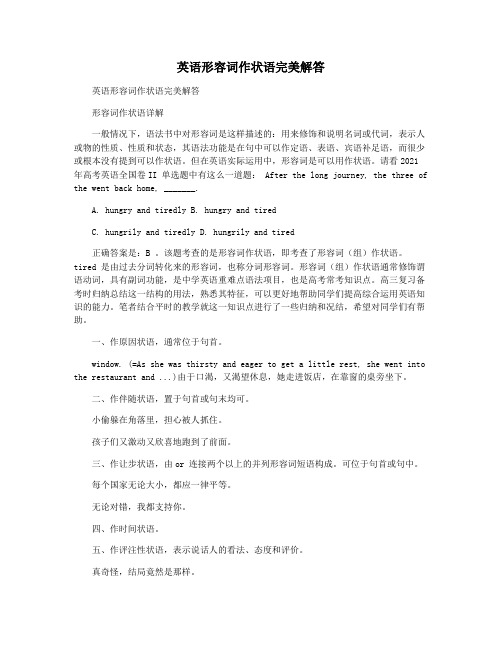高中英语语法形容词作状语
高中英语语法系列――形容词和副词

高中英语语法系列――形容词和副词[知识梳理]一、形容词的概念与用法形容词(adjective)用以修饰名词,表示人或事物的特征。
它可在句中充当定语,修饰名词、代词;可以作表语或宾(主)语的补足语,表示主语或宾语的状态、特征;有时也可以作状语。
如:This is a beautiful school.这是一所美丽的学校。
(作定语,修饰名词school)I have something important to tell you.我有些重要的事要告诉你们。
(作定语,修饰不定代词something)Our school is beautiful.我们学校很美丽。
(作表语)We’ll make our school more beautiful.我们要使我们的学校更美丽。
(作宾补)Our school will be made more beautiful.我们的学校将会变得更美丽。
(作主补)He got home late that night, hungry and tired.那天晚上他很迟才回来,又累又饿。
(作状语)二、副词的概念与用法副词(adverb)用以修饰动词、形容词或其它副词。
它在句中主要作状语,个别副词也可作表语、定语、或宾(主)语补足语。
He studies hard.他学习很努力。
(作状语,修饰动词)I’m terribly sorry for being late. 非常抱歉,我迟到了。
(作状语,修饰形容词)This coat fits him very well.这件上衣他穿着很合适。
(作状语,修饰副词)The people here are kind to us.这里的人对我们很好。
(作定语,修饰The people)When will you be back? 你什么时候回来?(作表语)三、形容词与副词的转换有的形容词加上ly后可转换成副词,规则如下:注意:friendly, motherly, lovely等词虽然以ly结尾,但不是副词,而是形容词。
英语形容词作状语完美解答

英语形容词作状语完美解答英语形容词作状语完美解答形容词作状语详解一般情况下,语法书中对形容词是这样描述的:用来修饰和说明名词或代词,表示人或物的性质、性质和状态,其语法功能是在句中可以作定语、表语、宾语补足语,而很少或根本没有提到可以作状语。
但在英语实际运用中,形容词是可以用作状语。
请看2021年高考英语全国卷II 单选题中有这么一道题: After the long journey, the three of the went back home, _______.A. hungry and tiredlyB. hungry and tiredC. hungrily and tiredlyD. hungrily and tired正确答案是:B 。
该题考查的是形容词作状语,即考查了形容词(组)作状语。
tired 是由过去分词转化来的形容词,也称分词形容词。
形容词(组)作状语通常修饰谓语动词,具有副词功能,是中学英语重难点语法项目,也是高考常考知识点。
高三复习备考时归纳总结这一结构的用法,熟悉其特征,可以更好地帮助同学们提高综合运用英语知识的能力。
笔者结合平时的教学就这一知识点进行了一些归纳和况结,希望对同学们有帮助。
一、作原因状语,通常位于句首。
window. (=As she was thirsty and eager to get a little rest, she went into the restaurant and ...)由于口渴,又渴望休息,她走进饭店,在靠窗的桌旁坐下。
二、作伴随状语,置于句首或句末均可。
小偷躲在角落里,担心被人抓住。
孩子们又激动又欣喜地跑到了前面。
三、作让步状语,由or 连接两个以上的并列形容词短语构成。
可位于句首或句中。
每个国家无论大小,都应一律平等。
无论对错,我都支持你。
四、作时间状语。
五、作评注性状语,表示说话人的看法、态度和评价。
真奇怪,结局竟然是那样。
高中英语语法知识点状语从句

• as, (just) as…so…引导的方式状语从句通常位于主句后,但在(just)as…so…结构中 位于句首,这时as从句带有比喻的含义,意思是"正如…","就像",多用于正式文体。例如:
• Always do to the others as you would be done by.你希望人家怎样待你,你就要怎样待人。 • As water is to fish, so air is to man. 我们离不开空气,犹如鱼儿离不开水。
• Just as we sweep our rooms, so we should sweep backward ideas from our minds. • 正如打扫房屋一样,我们也要扫除我们头脑中落后的东西。
• as if, as though
• 两者的意义和用法相同,引出的状语从句谓语多用虚拟语气,表示与事实相反,有时也用 陈述语气,表示所说情况是事实或实现的可能性较大。汉译常作"仿佛……似的","好 像……似的"。例如:
条件状语从句
• 连接词主要有 if, unless, as/so long as, on condition that 等。if 引导的条件句有真实条件句 和非真实条件句两种。非真实条件句已在虚拟语气中阐述。
• unless = if not. 例如: • Let's go out for a walk unless you are too tired. 如果不太累,我们去散散步。 • If you are not too tied, let's go out for a walk.
形容词和副词做状语辅导

英语中形容词的状语功能及语义特征形容词作状语具有双重特点,既要说明其逻辑主语的性质或状态,又要说明句子中的谓语动词;可表示时间、原因、条件、方式、强调或伴随状况等意义;形容词作状语,就结构模式来说,分为不带从属连词和带有从属连词二种。
形容词作状语实际上是一种省略结构。
形容词结构既有限定动词词组也没有非限定动词词组作谓语动词。
因此,它既不同于限定分句,也不同于非限定分句。
基本上属于SVO(主-动-补)句型,只是动词不表现出来,主语也通常不表现出来。
形容词作状语时,一般用逗号将其与句子的其余部分分开。
位置也相对灵活,可位于句首、句末或句中。
本文从形容词作状语的结构模式、句法功能、语义特征等方面做一些简单探讨。
一、形容词作状语的结构模式形容词作状语,就结构模式来说,分为不带从属连词和带有从属连词两种。
1.不带从属连词结构(1)单个形容词结构① Curious,we look around for other guests.由于好奇,我们向四面看看还有什么别的客人。
②The hours passed fitfully ,as I lay awake thinking and praying.时间过得断断续续,那晚我时醒时睡,当我醒着时就思考和祈祷。
(2)并列形容词结构①She was an elderly woman, sensible and trustworthy.她是一个明智的、值得信赖的妇女。
②Large or small, all countries are equal.国家无论大小都应一律平等。
③Finally, tired but happy, they took the bus back to school.最后,他们疲惫而又高兴地坐车回到了学校。
(3)形容词词组作状语①Afraid of difficulties, they prefer to take the easy road.他们由于怕困难,宁愿走容易的道路。
形容词作状语

形容词作状语一般情况下,语法书中对形容词是这样描述的:用来修饰和说明名词或代词,表示人或物的性质、性质和状态,其语法功能是在句中可以作定语、表语、宾语补足语,而很少或根本没有提到可以作状语。
但在英语实际运用中,形容词是可以用作状语。
请看2008年高考英语全国卷II单选题中有这么一道题:After the long journey, the three of the went back home, _______. A. hungry and tiredly B. hung ry and tired C. hungrily and tiredly D. hungrily and tired正确答案是:B。
该题考查的是形容词作状语,即考查了形容词(组)作状语。
Surprised and happy, Tony Stood up and accepted the prize. 2006全国卷32题1. 形容词(组)用作状语,常常表示伴随情况。
可以放在句首,也可放在句末。
Over joyed, they rushed to the front. 他们非常高兴,急步跑到前面。
The thief hid himself in the corner, afraid of being caught. 小偷躲在角落里,担心被人抓住。
2.作原因状语,通常位于句首。
Thirsty and eager to get a little rest, he went into the tea-house and seated himself at a little table. Easy to be with, he is warmly welcomed. 因为平易近人,所以他受到热烈欢迎。
3.作结果状语,一般位于句末。
Tom reached home at last, tired and hungry.He returned from war, safe and sound. 他安然无恙地从战争中归来。
英语语法:定语、状语、补语

不定式作状语
To search for gold, many people went to California.
为了找黄金,很多人到加利福尼亚去。
They lifted a rock only to drop it on their own feet.
他们搬起石头砸了自己的脚。
The room is comfortable to live in. 这房间住起来舒服。
分词短语作状语
Working in this way, they greatly cut the cost.用这种方法,他们大大地降低了 成本。
Compared to many women, she is indeed very fortunate.和很多妇女相比,她的 确很幸运。
不定式短语作定语
不定式 不定式的基本形式:to+动词原形。 I have nothing to worry about. 我没什么好担忧的。 He gave me some books to read. 他给我一些书看。 注:不定式不能做谓语。
不定式作定语
Do you have anything more to say? 你还有什么话要说吗? There is nothing to worry about. 没什么好担心的。 I have a lot of homework to do. 我有很多作业要做。
此外,词组、复合结构、从句也可作状语 如:
I'll stay here another five months. 我将在这里再呆五个月。(词组作状语)
He entered the room, his nose red with cold. 他走进房间,鼻子冻得通红。(复合结构)
高中英语必会的8大基本句子成分
高中英语必会的8大基本句子成分无论是“理解”还是“表达”,均需建立在准确理解句子成分基础上。
一个句子若没有句子成分的合理架构、有序排列,就会杂乱无章,不知所云。
所以,学好语法,应从正确划分句子成分入手。
众所周知,句子有若干个组成部分,它们分别承担着不同的作用,组成句子的各个部分叫作句子成分。
英语中的句子成分分为主语(subject)、谓语(predicate)、宾语(object)、表语(predicative)、定语(attribute)、状语(adverbial)、补语(complement)和同位语(appositive)八种。
一、主语习惯于发号施令,偶尔也会被赶下台在句子中,主语是执行句子的行为或动作的主体。
主语一般位于句子开头,且不能省略。
但在某些特定的句式里,如:疑问句、倒装句、祈使句、感叹句等,句子主语也可以“下台”而位于谓语动词之后或省略。
能够充当主语的主要有名词(短语)、代词、数词、动名词(短语)、动词不定式(短语)和从句等。
真题例句1. (2020ꞏ新课标山东卷)The route went from our school gate to the foot of the South Mountain.(名词作主语)2. (2020ꞏ全国卷Ⅱ,满分作文)Taking part in a fruit picking activity on a farm is meaningful and rewarding.(动名词短语作主语)3. (2017ꞏ全国卷Ⅰ,书面表达) To start with, what I intend to stress is that we are about to start our next lesson in Classroom 8 of the Teaching Building at 10 a.m. next Friday.(从句作主语)4. (2019ꞏ全国卷Ⅱ书面表达)The competition will begin at 2 pm and last for roughly 3 hours.(名词作主语)5. (2019ꞏ全国卷Ⅰ书面表达)To let China go to the world and let the world understand China is my first aim.(不定式短语作主语)6. (2019ꞏ江苏高考书面表达)It seems to me that thetraditional Chinese dress will make the occasion very Chinese and inviting to theBritish students.(代词it 充当形式主语,that引导的主语从句作真正的主语)[名师指津]当从句作主语时,为避免头重脚轻,可用it作形式主语。
英语语法:状语从句八大类型的区分以及知识点讲解
英语语法:状语从句八大类型的区分以及知识点讲解NO.1 副词作状语(1)句子副词:句子副词用于修饰句子(而不是修饰某个单个的词),反映说话人的观点和看法。
如actually, apparently, certainly, clearly,definitely, evidently, fortunately, frankly, honestly, luckily, obviously, perhaps, possibly, probably, surely, undoubtedly, unexpectedly 等。
作用以及位置:句子副词通常位于句首(或分句句首)。
Eg:Obviously he can't tell the difference between them. 显然他无法区别两者的不同。
I arrived late but luckily the meeting had been delayed. 我迟到了,幸而会议推迟了。
但有些句子副词也可以出现句中。
eg:He smiled nastily. He evidently knew something I didn't. 他发出狞笑,他显然知道一些我所不知道的事。
有的句子也可用作其他种类的副词,不过这往往会导致位置和语义的变化:Clearly he didn't say so. 显然他没有这样说。
(句子副词)He didn't say so clearly. 他说得没有那么清楚。
(方式副词)(2)起连词作用的副词连接副词就是连接词,如besides,meanwhile,then, therefore, thus, However,Otherwise, so, yet 等。
作用以及位置:常放在两个句子中间,前面为逗号,后面放连接词,从句之前。
注意:so 也可放在形容词之前做修饰,yet 可放句尾或从句之前。
【高中英语语法 词性】浅议形容词(短语)和副词(短语)作状语英语听力
【高中英语语法词性】浅议形容词(短语)和副词(短语)作状语请先看2006年高考英语试题(NMET,I)第32题:_______ and happy,Tony stood up and accepted the prize.A.Surprising B.SurprisedC.Being surprised D.To be surprised答案与简析:答案为B。
该题是考查形容词(短语)作状语。
题干逗号之前形容词短语的逻辑主语是人(Tony),故空白处应填由过去分词转变而来的并含被动意义的形容词Surprised,表示伴随状况,而不能填表示主动意义的由现在分词转变而来的形容词Surprising;C、D两项不是形容词(短语),应排除。
另外,形容词(短语)作状语时具有副词的功能,这是英语中常见的一种语言现象,要注意它与副词(短语)充当状语时的区别。
请看下例:1)He咖less,we watched our home destroyed before our eyes.2)Hopefully, we can get this done before dark.仔细分析上述两句我们可以发现:第一,句1)中的形容词helpless修饰主语,并和主语we 构成逻辑上的主谓关系,即:We are helpless。
句2)中的副词hopefully修饰整个句子,作状语。
第二,句1)中的helpless可以扩充为一个主语从句,因此,整个句子可以变为:We are heloless when we watched our home destroyed before our eyes.而句2)中的hopefully可以变为主语从句,整个句子可以变为:It's hopeful that we can get this done before dark.请看另一道高考题:(2004上海春招)_______, some famous scientists have the qualities of being both careful and careless.A.Strangely enough B.Enough strangelyC.Strange enough D.Enough strange答案与简析:该题中的Strangely enou曲是个用作状语的副词短语,修饰整个句子,该短语可以变为一个主语从句。
高中英语语法知识:形容词和副词
高中英语语法知识:形容词和副词形容词是用来修饰名词或代词的词,主要用作定语、表语和补足语等。
副词是用来修饰动词、形容词、副词、介词短语或全句的词,主要用状语、表语和定语等。
下面就形容词和副词的相关知识作如下讲解。
1. 形容词及其用法1) 直接说明事物的性质或特征的形容词是性质形容词,它有级的变化,可以用程度副词修饰,在句中可作定语、表语和补语。
例如:hot。
2) 叙述形容词只能作表语,所以又称为表语形容词。
这类形容词没有级的变化,也不可用程度副词修饰。
大多数以a开头的形容词都属于这一类。
例如:afraid 害怕的。
这类词还有well,unwell,ill,faint,afraid,alike,alive,alone,asleep,awake 等。
3) 形容词作定语修饰名词时,要放在名词的前边。
但是如果形容词修饰以-thing 为字尾的词语时,要放在这些词之后。
例如:something nice.2. 以-ly结尾的形容词1) 大部分形容词加-ly可构成副词。
但friendly,deadly,lovely,lonely,likely,lively,ugly,brotherly,仍为形容词。
改错:(错) She sang lovely.(错) He spoke to me very friendly.(对) Her singing was lovely.(对) He spoke to me in a very friendly way.2) 有些以-ly 结尾既为形容词,也为副词,如daily,weekly,monthly,yearly,early等。
例如:The Times is a weekly paper. 《时代周刊》为周刊。
The Times is published weekly. 《时代周刊》每周发行一期。
3. 用形容词表示类别和整体1) 某些形容词加上定冠词可以泛指一类人,与谓语动词的复数连接,如the dead,the living,the rich,the poor,the blind,the hungry等。
- 1、下载文档前请自行甄别文档内容的完整性,平台不提供额外的编辑、内容补充、找答案等附加服务。
- 2、"仅部分预览"的文档,不可在线预览部分如存在完整性等问题,可反馈申请退款(可完整预览的文档不适用该条件!)。
- 3、如文档侵犯您的权益,请联系客服反馈,我们会尽快为您处理(人工客服工作时间:9:00-18:30)。
形容词作状语
形容词在句中作定语、表语和宾语补足语的情况很多,但作状语的时候也不少。
女口: The bag fell on the
floor and broke open.袋子掉到地上摔破了。
Glad to accept the girl nodded her agreement. 这姑娘乐于接受,点头表示同意。
形容词(短语)作状语时,通常说明主语的情况,即表示主语的状态、性质、特征等,有时它和宾语的关系密切,且可位于句首、句末和句子中间,通常和句子的其它部分用逗号分开,但单个形容词可
以连在一起。
一、形容词(短语)作状语说明主语的情况,可以表示动作或状态发生的原因、方式、时间或伴随等, 或对谓语作补充说明。
1. 表示原因,但原因意义不很突出,有时是并列的。
例如:
Afraid of difficulty, he prefers to do the easy maths problem.他害怕困难,宁愿做容易的数学题。
Anxious for a quick decisiop our leader called for a vote.我们队长急于迅速作出决定,要求进行表
决。
2. 表示方式或伴随。
例如:
The lost boy spe nt three days in the forest cold and hungry.那个迷路的男孩又冷又饿地在森林中过了二天。
The moon had just risen, very golden over the hill.
月亮刚刚升起,挂在山上,十足的金黄色。
3. 形容词(短语)作状语时,它和句中谓语动词在意义上的联系不密切,只是对谓语补充说明。
Effective the first of October, our supermarket will close at eleven. 我们超市 ^一点关门,从十月一日起生
效。
Contrary to all advice they started to climb the
他们不听一切劝告,冒着风暴出发登山。
4. 形容词(短语)作状语可表示时间或条件。
例如:Ripe, these peaches are sweet.这些桃子熟了时是很甜的。
Enthusiastic they make good stude nts.用功的时候, 他们是好学生。
二、说明宾语的情况时,形容词(短语)作状语紧接其后。
例如:
They ate the beef cold一他们吃的牛肉是凉的。
I pushed the window open. 我把窗子推开。
这种结构为被动句时,形容词则又变为说明被动句中主语的情况。
例如:
The door was pushed open. 门被推开了。
The apples were picked ripe. 这些苹果是熟的时候摘的。
